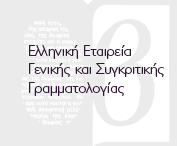Τ Williams' use of Dionysicism is evident in his theater. A very interesting sample of this use can be found in Battle of Angels, Orpheus Descending, Camino Real and Suddenly Last Summer. These plays present various treatments of the ritual and the myth in the playwright's effort to give a universal meaning to the plights of modern man. The Orphic identity of Dionysus is predominant in Battle of Angels (1940), which was one of Williams' favorite plays. The use of Orphic Dionysicism expresses the playwright himself who believed that Battle of Angels was «coming directly from his heart as an expression of fundamental human hungers». It has been often labelled as «the root Williams play, a powerful mixture of sex, violence and religion». He revised it on and off for seventeen years before its mature version, Orpheus Descending, appeared in 1957. Both plays tell us about the advent of the Orphic hero to a city of the American South, the revival that he brings and his death-«sparagmos» that is commemorated by the inclusion of the snakeskin jacket in the local museum. In these plays, springsummer is followed by autumn-winter, and there is no continuation of the ritual, no god's resurrection and no coming of the following spring. Battle of Angels and Orpheus Descending could therefore be classified as Williams' non-regenerative plays in the sense that they do not follow the cyclical pattern of the Dionysiac death and rebirth.
(EL)
Τ Williams' use of Dionysicism is evident in his theater. A very interesting sample of this use can be found in Battle of Angels, Orpheus Descending, Camino Real and Suddenly Last Summer. These plays present various treatments of the ritual and the myth in the playwright's effort to give a universal meaning to the plights of modern man. The Orphic identity of Dionysus is predominant in Battle of Angels (1940), which was one of Williams' favorite plays. The use of Orphic Dionysicism expresses the playwright himself who believed that Battle of Angels was «coming directly from his heart as an expression of fundamental human hungers». It has been often labelled as «the root Williams play, a powerful mixture of sex, violence and religion». He revised it on and off for seventeen years before its mature version, Orpheus Descending, appeared in 1957. Both plays tell us about the advent of the Orphic hero to a city of the American South, the revival that he brings and his death-«sparagmos» that is commemorated by the inclusion of the snakeskin jacket in the local museum. In these plays, springsummer is followed by autumn-winter, and there is no continuation of the ritual, no god's resurrection and no coming of the following spring. Battle of Angels and Orpheus Descending could therefore be classified as Williams' non-regenerative plays in the sense that they do not follow the cyclical pattern of the Dionysiac death and rebirth.
(EN)

